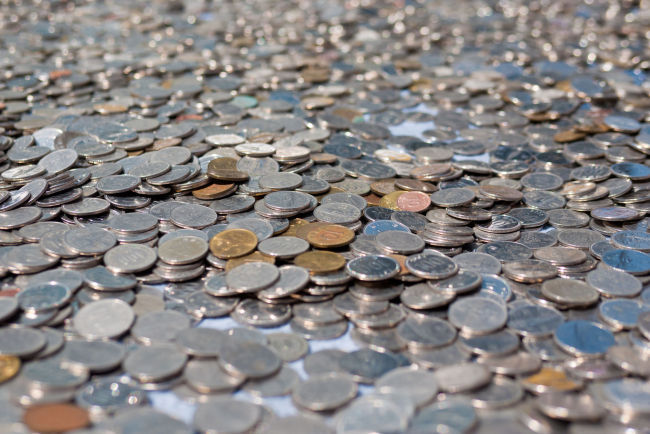Kim Kyung-min, 27, was not aware of a pilot project by the Bank of Korea to reduce the use of coins until she was told by The Korea Herald.
“Things would be convenient if I were able to receive change directly through my bank account,” Kim said, adding that carrying coins “can sometimes be a hassle.”
Dubbed “Coinless Society,” the BOK’s project has got a lukewarm response from the public during its two months of operation. The project encourages users to store their change in public transportation cards, called T-Money, or receive convertible points for mobile payments.
The limited number of participating stores and security concerns are cited as the biggest hurdles to the project taking off.
Even the BOK admitted that most South Koreans -- both customers and store clerks -- were unaware of the project in a recent report.
 |
(123rf) |
From June 1-10, South Korean customers on a daily basis received an average of some 6.6 million won ($5,900) in change in the form of reward points instead of coins across some 36,600 transactions in stores, the report said.
The figures were slightly higher compared to the first month of the project. From April 20-30, there were 32,900 transactions per day and people got their change back in points worth 6.4 million won.
Convenience store franchises CU, 7-Eleven and With Me, as well as retailers E-mart and Lotte Mart, have joined the project with their combined 23,000 stores nationwide,
However, different brands have different payment systems.
Kim noted the project should be applied to a more universal means of payment.
“I doubt the project is effective as of now. For example, T-Money is only used by a limited number of people,” she said.
An infrastructure allowing stores to remit change through a customer’s bank account would enable the project to go full-scale.
But Park Woo-ri, 29, voiced concerns over privacy if the “Coinless Society” takes shape as planned.
“I wouldn’t want my bank account information or transaction records left anywhere for use,” said Park, who had also not heard of the project until The Korea Herald mentioned it.
The policy move was largely based on South Korea’s “solid environment in electronic payments” and “demands to tackle the inconvenience caused by coins,” according to the BOK.
“The BOK is seeking to lay out an infrastructure for those who suffer inconvenience from coins and who would choose not to use coins,” Kim Jeong-kyu, a BOK official, said.
The project is a part of the bank’s five-year initiative until 2020. It came in response to the central bank’s 2016 survey of 2,500 people, in which more than half of the respondents were in favor of the coin-reducing project. The survey also indicated that bank accounts and stored-value cards would be the favorite destination of storing change.
In 2016, the BOK produced some 600 million coins, which cost some 61 billion won.
The project, however, does not have tangible cost-cutting goals. It does not aim to eliminate coins completely but to offer additional choices for customers at stores, according to Kim of the BOK.
By Son Ji-hyoung (
consnow@heraldcorp.com)








